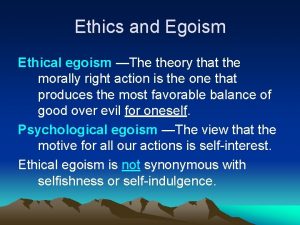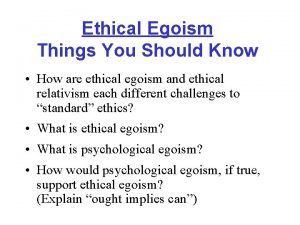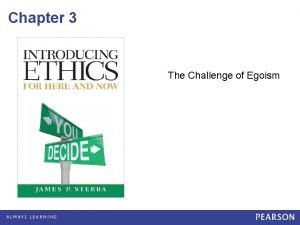Ethical Egoism Ethical Egoism Things You Should Know












- Slides: 12

Ethical Egoism

Ethical Egoism Things You Should Know • How are ethical egoism and ethical relativism each different challenges to “standard” ethics? • What is ethical egoism? • What is psychological egoism? • How would psychological egoism, if true, support ethical egoism? (Hint: “ought implies can”)

Good Quiz Question How would psychological egoism, if true, support ethical egoism? (Hint: “ought implies can”)

Things You Should Know (continued) • What arguments are offered in favor of psychological egoism? • Why do most philosophers reject psychological egoism? • What are the main arguments against ethical egoism? • What does Rachels say about this? • What does course pack say about this?

Ethical Egoism: A Normative Claim Definition: One’s only moral obligation is to maximize one’s own interests. • Consider genuine interests, not just crude or obvious ones. • Consider long-term as well as short-term: help others and sacrifice if (but only if) it will help oneself in the long term.

Argument for Ethical Egoism* • It leads to the good for all • Similar to argument for capitalism based on Adam Smith’s “invisible hand” • Criticisms • Doesn’t actually lead to good for all • It’s not really an argument for ethical egoism but more an argument for utilitarianism

Argument for Ethical Egoism: Psychological Egoism • Psychological egoism is a purely descriptive claim. • Definitions: • People are only capable of acting in what they think is their own self-interest. • People are always motivated by self-interest. • It is impossible for people to act on a motivation purely to help others or to do “the right thing, ” conflicting with self-interest.

So what? • Psychological egoism is a descriptive claim, not an ethical claim. So why does it matter? • If it only claimed that sacrificing self-interest is difficult, it would not be a challenge to ethics. • Crucial point: “ought implies can”

Is Psychological Egoism (PE) True? Look inside yourself • PE: People are motivated by desire for good reputation, return gain, etc. • PE: Even when people help others or sacrifice, they get a good feeling out of it. • PE: Whatever people do, they are satisfying one of their own desires.

Response to Arguments for Psychological Egoism • Many acts not for obvious gains. • Not enough to show people GET a good feeling, act must be for the sake of good feeling (or avoiding guilt). • Confusion: psychological egoism must show that object of desire is self-interest.

Distinguish 2 Things Mother Teresa helps starving children Who is the subject? What is the object (Whose desire is of the desire? being satisfied? ) Of course it’s Mother The object must be Teresa’s desire, but herself. that’s no argument for No evidence for this. PE.

Arguments Against Ethical Egoism • Why shouldn’t you harm others? Because they would be harmed! • Ethical egoism is simply not the ethical point of view because it cannot solve conflicts of interests. (Note the assumption made about what the purpose of ethics.
 Ethical egoism
Ethical egoism Egoism ethics
Egoism ethics Ayn rand ethical egoism
Ayn rand ethical egoism Psychological hedonism
Psychological hedonism Ethical egoism definition
Ethical egoism definition Common things everyone should know
Common things everyone should know Parabola standard form
Parabola standard form 15 things every veteran wants you to know
15 things every veteran wants you to know Know history know self
Know history know self Do deep generative models know what they don’t know?
Do deep generative models know what they don’t know? I know who goes before me i know who stands behind
I know who goes before me i know who stands behind Fun facts about minecraft
Fun facts about minecraft ,,
,,





















